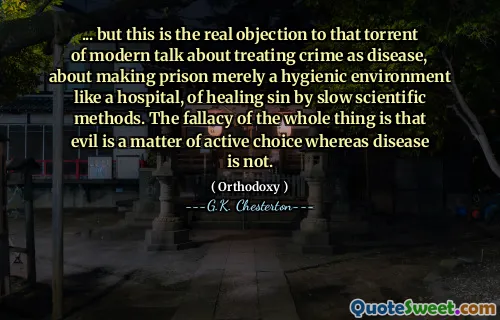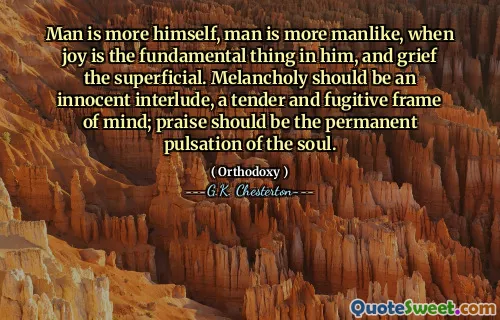
Man is more himself, man is more manlike, when joy is the fundamental thing in him, and grief the superficial. Melancholy should be an innocent interlude, a tender and fugitive frame of mind; praise should be the permanent pulsation of the soul.
G.K. Chesterton's reflection beautifully captures the essence of genuine humanity. He suggests that true self-awareness and authenticity flourish when joy takes precedence over sorrow. In a world often dominated by struggles and melancholy, Chesterton advocates for viewing emotional depth as transient and not the core identity of a person. Joy acts as the fundamental state, allowing individuals to express their true nature more freely. Melancholy, in this context, is portrayed as a temporary, innocent mood—a brief interlude rather than a defining characteristic. It is like a tender shadow passing through a sunny landscape, enriching rather than overshadowing the human experience.
The idea of praise as the 'permanent pulsation of the soul' emphasizes the importance of cultivating a spirit of gratitude and admiration actively. It encourages us to focus on the positive aspects of life, finding beauty and meaning even amid difficulties. This perspective urges a shift from dwelling on the superficial sorrows towards embracing joy at its core, suggesting that such an outlook leads to a more authentic, lively, and fulfilled existence.
In embracing this philosophy, one recognizes that moments of happiness are vital to expressing their true selves and living fully. It offers a hopeful outlook, urging individuals to foster joy, praise, and positive emotions as their innate state. Chesterton’s insight points towards a balanced emotional life—where sorrow is acknowledged without becoming overpowering, and joy takes its rightful place at the heart of human experience. This balance ultimately nurtures resilience and authenticity, allowing the human spirit to thrive and manifest its best qualities.







